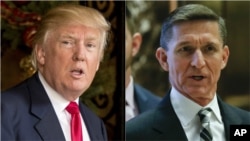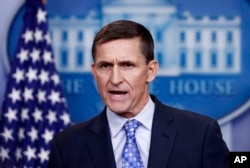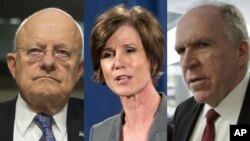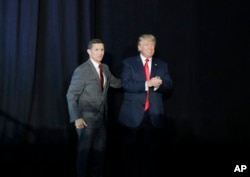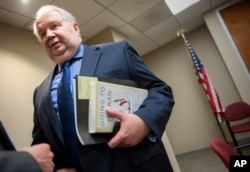In late November, a member of Donald Trump's transition team approached national security officials in the Obama White House with a curious request: Could the incoming team get a copy of the classified CIA profile on Sergey Kislyak, Russia's ambassador to the United States?
Marshall Billingslea, a former Pentagon and NATO official, wanted the information for his boss, Michael Flynn, who had been tapped by Trump to serve as White House national security adviser.
Billingslea knew Flynn would be speaking to Kislyak, according to two former Obama administration officials, and seemed concerned Flynn did not fully understand he was dealing with a man rumored to have ties to Russian intelligence agencies.
To the Obama White House, Billingslea's concerns were startling: a member of Trump's own team suggesting the incoming Trump administration might be in over its head in dealing with an adversary.
The request now stands out as a warning signal for Obama officials who would soon see Flynn's contacts with the Russian spiral into a controversy that would cost him his job and lead to a series of shocking accusations hurled by Trump against his predecessor's administration.
Grew distrustful
In the following weeks, the Obama White House would grow deeply distrustful of Trump's dealing with the Kremlin and anxious about his team's ties. The concern -- compounded by surge of new intelligence, including evidence of multiple calls, texts and at least one in-person meeting between Flynn and Kislyak -- would eventually grow so great Obama advisers delayed telling Trump's team about plans to punish Russia for its election meddling.
Obama officials worried the incoming administration might tip off Moscow, according to one Obama adviser.
The Trump White House declined to comment.
This account of the closing days of the Obama administration is based on interviews with 11 current and former U.S. officials, including seven with key roles in the Obama administration.
The officials reveal an administration gripped by mounting anxiety over Russia's election meddling and racing to grasp the Trump team's possible involvement before exiting the White House. Most of the officials spoke on the condition of anonymity in order to discuss sensitive national security information.
The Obama White House's role in the Russia controversy will come under fresh scrutiny Monday.
Former Director of National Intelligence James Clapper and former deputy Attorney General Sally Yates are slated to testify before lawmakers on the Senate Judiciary Committee, one of three committees investigating Trump's associates links to Moscow.
Trump has said he has no nefarious ties to Russia and isn't aware of any involvement by his aides in Moscow's interference in the election. He's dismissed an FBI and congressional investigations into his campaign's possible ties to the election meddling as a ``hoax'' driven by Democrats bitter over losing the White House.
To testify
Yates, an Obama administration official who carried over into the Trump administration, is expected to tell lawmakers that she expressed alarm to the Trump White House about Flynn's contacts with the Russian ambassador.
Trump fired Yates days later, after she told the Justice Department to not enforce the new president's travel and immigration ban. Flynn was forced to resign three weeks later for misleading Vice President Mike Pence and other officials about the content of his discussions with Kislyak.
Yates's warnings about Flynn in January capped weeks of building concern among top Obama officials.
The president himself that month told one of his closest advisers that the FBI, which by then had been investigating Trump associates' possible ties to Russia for about six months, seemed particularly focused on Flynn.
Obama aides described Flynn as notably dismissive of the threat Russia posed to the United States when discussing policy in transition meetings with outgoing national security adviser Susan Rice and other top officials.
Officials also found it curious that Billingslea only ever asked Obama's National Security Council for one classified leadership profile to give to Flynn: the internal document on Kislyak.
The CIA compiles classified biographies of foreign officials, known as leadership profiles. The profiles include U.S. intelligence assessments about the officials, in addition to biographical information.
Refused to comment
When reached by the AP, Billingslea refused to comment. Last month, Trump announced his intention to nominate Billingslea to serve as assistant secretary for terrorist financing at the Treasury Department.
Trump has accused Obama officials of illegally leaking classified information about Flynn's contacts with Kislyak. He's also contended, without evidence, that Rice asked for the names of Trump officials caught up in routine intelligence monitoring to be improperly revealed, a charge Rice has denied.
The distrust in the other camp was clear months earlier. In late December, as the White House prepared to levy sanctions and oust Russians living in the in the U.S. in retaliation for the hacks, Obama officials did not brief the Trump team on the decision until shortly before it was announced publicly.
The timing was chosen in part because they feared the transition team might give Moscow lead time to clear information out of two compounds the U.S. was shuttering, one official said.
While it's not inappropriate for someone in Flynn's position to have contact with a diplomat, Obama officials said the frequency of his discussions raised enough red flags that aides discussed the possibility Trump was trying to establish a one-to-one line of communication -- a so-called back channel -- with Russian President Vladimir Putin.
Obama aides say they never determined why Flynn was in close contact with the ambassador.
Even with the suspicion, the officials said they did not withhold information.
The outgoing White House also became concerned about the Trump team's handling of classified information.
Documents copied, removed
After learning that highly sensitive documents from a secure room at the transition's Washington headquarters were being copied and removed from the facility, Obama's national security team decided to only allow the transition officials to view some information at the White House, including documents on the government's contingency plans for crises.
Some White House advisers now privately concede that the administration moved too slowly during the election to publicly blame Russia for the hack and explore possible ties to the Trump campaign.
Others say it was only after the election, once Obama ordered a comprehensive review of the election interference, that the full scope of Russia's interference and potential Trump ties become clearer.




